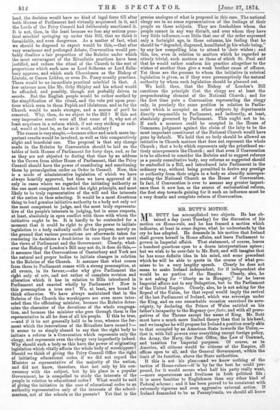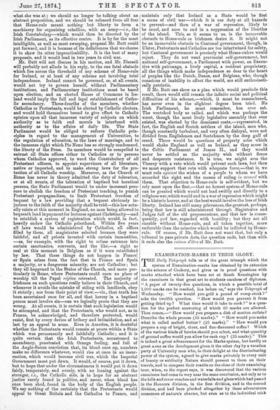MR. BUTT'S MOTION.
MR. BUTT has accomplished two objects. He has ob- tained a day (next Tuesday) for the discussion of his motion on Home-rule, and he has framed a motion which indicates, at least in some degree, what he understands by the cry be has adopted. He demands in his motion that Ireland shall govern herself in Home affairs, and leave Parliament to govern in Imperial affair's. That statement, of course, leaves a hundred questions open to a dozen interpretations apiece; but we wish to be over-fair to Mr. Butt, and will imagine that he has some definite idea in his mind, and some precedent which he will be able to quote in the course of what pro-
mises to be a very lengthy speech. Clearly he does not mean to make Ireland independent, for if independent she
would be no portion of the Empire. Clearly, also, he is not asking for " liberty as in Hungary," for he leaves Imperial affairs not to any Delegation, but to the Parliament of the United Empire. Clearly, also, he is not asking for the Repeal of the Union, for that repeal would imply the revival of the last Parliament of Ireland, which was sovereign under the King, and on one remarkable occasion exercised its sove- reignty, by declaring the Prince of Wales entitled on his father's incapacity to the Regency ipso facto, and with all prero- gatives of the Throne except the name of King. Mr. Butt must have a much more limited theory than that in his head, and we imagine he will propose for Ireland a position nearly akin to that occupied by an American State towards the Union,— that is, with full powers over everything except foreign policy, the Army, the Navy, the Post Office, the Law of Contract, and taxation for Imperial purposes. Of course, as in America, all citizens would be citizens of the Empire, all offices open to all, and the General Government, within the limit of its function, above the State authorities.
If this is not his plan—and we know nothing of the tactics of Home-rulers—it is by far the best he could pro- pound, for it would secure what half his party really want, —more separateness and liveliness in Irish political life ; it is more familiar to Englishmen than any other kind of Federal scheme ; and it has been proved to be consistent with extremely vigorous and even aggressive external action. If Ireland demanded to be as Pennsylvania, we should all know what she was at ; we should no longer be talking about an abstract proposition, and we should be released from all fear that Home-rule meant nothing but liberty to form a machinery for organising rebellion, with an army—i.e., the Irish Constabulary—which would then be directed by the Irish Parliament, as its effective centre. It is by far the most intelligible, as well as most sweeping, proposal Mr. Butt could put forward, and it is because of its definiteness that we choose it to show its utter impracticability. It is the best of many proposals, and it would lead in two years to civil war.
Mr. Butt will not discuss in his motion, and Mr. Disraeli will probably not allude in his reply, to the one fatal obstacle which lies across the threshold of any scheme of Home-rule for Ireland, or at least of any scheme not involving total independence. Ireland cannot be governed, or, at all events, would not try to govern herself, without Parliamentary institutions, and Parliamentary institutions must be based upon election, and an elected House of Commons in Ire- land would imply the full and legal establishment of Catho- lic ascendancy. Three-fourths of the members, whether Catholics or Protestants, would be elected by Catholic electors, and would hold themselves bound to give effect to Catholic opinion upon all that immense variety of subjects on which authority as to faith and morals is interfused with authority as to the affairs of daily life. The State Parliament would be obliged to enforce Catholic prin- ciples in regard to the management of Universities, to the regulation of education, to the laws of marriage, and to the immense right which Pio Nono has so strongly condemned, the liberty of the Press. Its members would be compelled to entrust all State offices either to Catholics or to persons whom Catholics approved, to weed the Constabulary of all Protestant officers, to appoint supervisors of all literature, native or imported, and to make strong laws for the pro- tection of all Catholic worship. Moreover, as the Church of Rome has never in theory admitted the duty of toleration, or at all events, of the toleration of baptised but heretical persons, the State Parliament would be under incessant pres- sure to abolish the freedom of Protestant teaching, to punish Protestant propagandism, to limit Protestant freedom of bequest by a law providing that a bequest obviously in- jurious to the faith of the majority shall be void—this law actu- ally exists at this moment in England, no man being allowed to bequeath land in payment for lectures against Christianity—and to establish a system of registration which would, in fact, heavily endow the Catholic priesthood. Within five years all laws would be administered by Catholics, all offices filled by them, all magistrates selected because they were faithful, and all priests invested with certain immunities, —as, for example, with the right to refuse entrance into certain sanctuaries, convents, and the like,—a right as real at this moment in Belgium as if it were established by law. That these things do not happen in France: or Spain arises from the fact that in France and Spain a majority, or a dangerous minority, are not Catholics ; but they all happened in the States of the Church, and more par- ticularly in Rome, where Protestants could open no place of worship till the Papal regime retreated. The majority of Irishmen on such questions really believe in their Church, and whenever it avoids the mistake of siding with landlords, obey it strictly ; nor from their point of view,—viz., that truth has been ascertained once for all, and that heresy in a baptised person must involve sin—can we logically prove that they are wrong. At all events, it is certain that such legislation would be attempted, and that the Protestants, who would not, as in France, be acknowledged, and therefore protected, would resist, first by every device of bribery and intimidation, and at last by an appeal to arms. Even in America, it is doubtful whether the Protestants would remain at peace within a State which was permanently and faithfully Catholic ; and it is quite certain that the Irish Protestants, accustomed to ascendancy, penetrated with Orange feeling, and full of the Anglo-Saxon conviction that, its blood once up, numbers make no difference whatever, would rise at once in an insur- rection, which would become civil war, which the Imperial Government must put down. It would, of course, put it down, but to hope that under the circumstances it would put it down fairly, temperately, and evenly, with no leaning against the stronger, i.e., the Catholic side, is to hope for an abstract justice rarely found in politics, and never, when blood has once been shed, found in the body of the English people. We say nothing of the certainty that the Protestants would appeal to Great Britain and the Catholics to France, and maintain only that Ireland as a State would be first a scene of civil war—which it is our duty at all hazards to prevent—and then of a war of repression, likely to be cruel, and sure to end in a suppression of the liberties of the island. This, as it seems to us, is the immovable obstacle to Home-rule as Irishmen desire it. It might not be an immovable obstacle to Cantonal government, though, in Ulster, Protestants and Catholics are too intertwined for safety, but Cantonal government is precisely what Home-rulers would reject. They do not want provincial self-government, but national self-government, a Parliament with power, an Execu- tive with patronage, a lively capital, a resident proprietary, all the things which make independence so dear to the heart of peoples like the Dutch, Danes, and Belgians, who, though conscious of inability to affect the world, are still enthusiasti- cally patriotic. If Mr. Butt can show us a plan which would preclude this result, there would still remain the infinite social and political difficulties of his scheme,—which, it must be remembered, has never even in the slightest degree been tried. No Irish Parliament, he must remember, has ever sat. The wretched body so called, and which was perhaps the worst, though the most lively legislative assembly that ever existed, was elected by the dominant caste,—represented, in fact, the English and Scotch settlers of the island, men who, though constantly turbulent, and very often disloyal, were not divided from Englishmen and Scotchmen by the deep gulf of creed. There would be questions of property arise which would shake England as well as Ireland, as they arose in the Celtic Parliament of James H., and they would never be settled as the majority wish without fierce and desperate resistance. It is true, we might arm the Viceroy with a veto which would prevent such laws, but then we must support that veto with adequate force,—that is, we must rule against the wishes of a people to whom we have accorded the right and the means of ruling in accord with them. That objection to Home-rule is self-evident, but we rely most upon the first,—that no honest system of Home-rule can be granted which would not lead swiftly and directly to a religious war,which would end in a war of repression which might be a historic horror, and at the best would involve the loss of Irish liberty. Ireland has still many grievances, the greatest, perhaps, being that law is still administered through Magistrates and Judges full of the old prepossessions, and that law is conse- quently, qud law, regarded with hostility ; but they are all curable without Home-rule, and all taken together, more endurable than the miseries which would be inflicted by Home- rule. Of course, if Mr. Butt does not want that, but only a tribunal to pass private Acts, the question ends, but then with it ends also the raison d'i>tre of Mr. Butt.



































 Previous page
Previous page